B2U2语法讲解
B2U2语言点.pdf
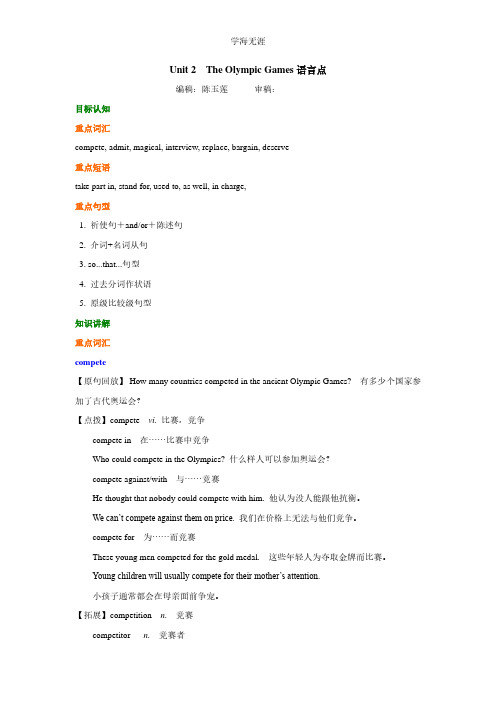
Unit 2 The Olympic Games语言点编稿:陈玉莲审稿:目标认知重点词汇compete, admit, magical, interview, replace, bargain, deserve重点短语take part in, stand for, used to, as well, in charge,重点句型1. 祈使句+and/or+陈述句2. 介词+名词从句3. so...that...句型4. 过去分词作状语5. 原级比较级句型知识讲解重点词汇compete【原句回放】How many countries competed in the ancient Olympic Games? 有多少个国家参加了古代奥运会?【点拨】compete vi. 比赛,竞争compete in 在……比赛中竞争Who could compete in the Olympics? 什么样人可以参加奥运会?compete against/with 与……竞赛He thought that nobody could compete with him. 他认为没人能跟他抗衡。
We can’t compete against them on price.我们在价格上无法与他们竞争。
compete for 为……而竞赛These young men competed for the gold medal. 这些年轻人为夺取金牌而比赛。
Young children will usually compete for their mother’s attention.小孩子通常都会在母亲面前争宠。
【拓展】competition n. 竞赛competitor n. 竞赛者competitive adj. 竞争的admit【原句回放】Only athletes who have reached the agreed standard for their event will be admitted as competitors. 只有达到他们各自项目的统一标准的运动员才会被允许参加奥运会。
B2U2知识梳理
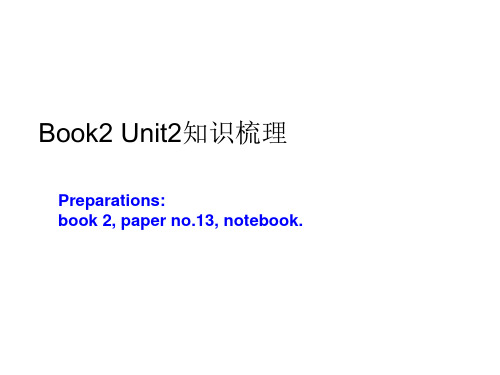
Attention
1.No other countries could join in the Olympic Games , nor
could slaves or women. 别的国家不能参加奥林匹克运动会,奴隶或妇女也不能。 (1)neither/nor + 助动词 + 主语。 “后者也不” ,表示延续否 定,可构成倒装结构:
I didn’t believe a word she said and neither did her mother. 我根本不相信她说的话,她妈妈也不相信 (2) so +助动词 + 主语. “后者也是”,表示延续肯定,可构成倒
装结 构: We have finished the job, so has Tom. (3) so it is with sb= It is the same with sb 某人也是这样。
2. charge vt 收费,要价,控告,充电 vi 冲向 n. 控告;费用;掌
管
charge sb money for (doing) sth 因为…向某人收钱
charge sb with sth= accuse sb of sth 控告某人某事
in charge of 掌管… take charge of 掌管… free of charge 免
Book2 Unit2知识梳理
Preparations: book 2, paper no.13, notebook.
考纲要求——运用词汇理解和表达不同的功能、意
图和态度等;能比较详细和生动地用英语描述情景、 态度或感情。
Learning Aims
1. Grasp the usage of 5words and 2 phrases and 2 sentence patterns in the unit.
b2u2要点
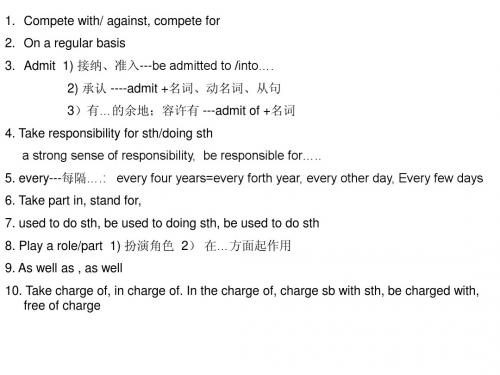
16. Pick up 1) 拾起,拿起 2) 中途搭载 3) 偶然获得,无意中学会 4) 接收,收听 5) 恢复健康
ቤተ መጻሕፍቲ ባይዱ
11. Advertise for sth/sb, 12. Bargain with sb over sth, make a bargain 13. Marry sb, marry sb to sb, be married to , get married to sb 14. Deserve to do sth , deserve to be done =deserve doing sth=deserve +名词 15. Promise 1) 答应、允诺 2) 有..的可能,有…的希望 Promise to do sth, Promise sb to do sth Make a promise Keep one’s promise Break one’s promise 答应做某事 答应某人做某事 许下诺言 信守诺言 违背诺言
新应用B2U2教案
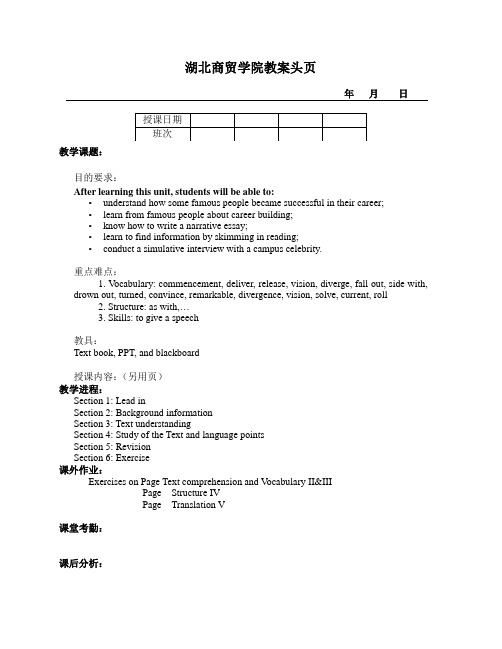
湖北商贸学院教案头页年月日教学课题:目的要求:After learning this unit, students will be able to:•understand how some famous people became successful in their career;•learn from famous people about career building;•know how to write a narrative essay;•learn to find information by skimming in reading;•conduct a simulative interview with a campus celebrity.重点难点:1. V ocabulary: commencement, deliver, release, vision, diverge, fall out, side with,drown out, turned, convince, remarkable, divergence, vision, solve, current, roll2. Structure: as with,…3. Skills: to give a speech教具:Text book, PPT, and blackboard授课内容:(另用页)教学进程:Section 1: Lead inSection 2: Background informationSection 3: Text understandingSection 4: Study of the Text and language pointsSection 5: RevisionSection 6: Exercise课外作业:Exercises on Page Text comprehension and V ocabulary II&IIIPage Structure IVPage Translation V课堂考勤:课后分析:New Applied College English Book 2Unit 2 Celebrity: You’ve Got to Find What You Love1. Teaching ObjectiveAfter learning this unit, students will be able to:•understand how some famous people became successful in their career;•learn from famous people about career building;•know how to write a narrative essay;•learn to find information by skimming in reading;•conduct a simulative interview with a campus celebrity.2. Key PointsVocabularycommencement, deliver, release, vision, diverge, fall out, side with, drown out, turned, convince, remarkable, divergence, vision, solve, current, rollStructureas with,…Skillsto give a speech3. Time Allocation4. Teaching ProceduresPart 1. Lead InGive a brief description of the 10 famous people listed on the textbook with no more than 20 words for each.Ask students to search for the education experience of Steve Jobs on the Internet by themselves.Part 2. Introduction of the Background InformationA commencement speech or commencement address is a speech given to graduating students, generally at a university, generally in the United States, although the term is also used for secondary education institutions. The "commencement" is a ceremony in which degrees or diplomas are conferred upon graduating students. A commencement speech is typically given by a notable figure in the community, during the commencement exercise. The person giving such a speech is known as a commencement speaker. Very commonly, colleges or universities will invite politicians, important citizens, or other noted speakers to come and address the graduating class.A commencement speech is less bound by the structure found in other forms of public address, like eulogies or wedding speeches. The speaker accordingly enjoys a unique freedom to express him or herself. Executive speechwriter Anthony Trendl writesA commencement speech, simply, is an opportunity to share your experience, values and advice. The precise form is up to you. This affords the speaker a platform to say amazing, unlimited things.Part 3. Understanding of main ideasTask 1 Decide whether the following statements are true (T) or false (F) according to the text.( F ) 1 Steve Jobs had never entered college at all.( T ) 2 Steve Jobs was only 20 years old when Apple was started.( F ) 3 Macintosh was released when Apple had just been founded for a decade.( T ) 4 Dismissal from a company sometimes is a good thing for people.( T ) 5 The technology developed by Jobs in NeXT is critical to Apple’s revival.( T ) 6 The only way to be really satisfied with your work is to do what you think is great.( F ) 7 Others’ point of view plays a very important role in your life.( F ) 8 To succeed, you should eat less and be silly.Task 2Ask students to complete the following summary according to the text, in orderPart 4. Study of the Text and language points1. commencement本意为“开始”,此处指“毕业典礼”,尤其是指美国大学的毕业典礼。
必修二unit2语法
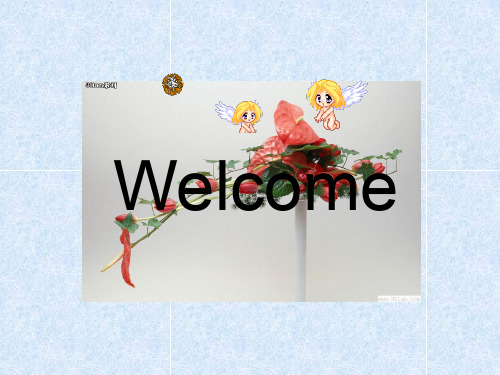
are
has
go gone
一. 何时使用被动语态
1. 不知道谁是动作的执行者或没有必要
Paper is made from wood. He was wounded in the fight. 2. 需要强调动作的承受者时
Books and newspapers in the reading room mustn't be taken away. He was awarded first prize in that contest.
The desks are made of wood.
He is asked a question by the teacher.
I was given a nice present by my friend
yesterday.
1.规则动词的过去分词:
1)一般情况在动词原形后加-ed
2)以不发音e结尾的加-d 3)以辅音加y结尾的,去y变i加-ed
The streets_w_i_ll_b_e_l_it__ (light) by electricity.
I w__il_l/_s_h_a_ll_n_o_t_b_e_i_n_vi_te_d_ (not invite)to tomorrow’s wedding.
allow
Dogs will not be allowed to enter your classroom.
Xu Sanduo has taught us never to abandon or give up anything.
2.Wang Baoqiang has been achieved a great success. (true or false)
初二下册英语第二单元讲义unit 2 语法篇
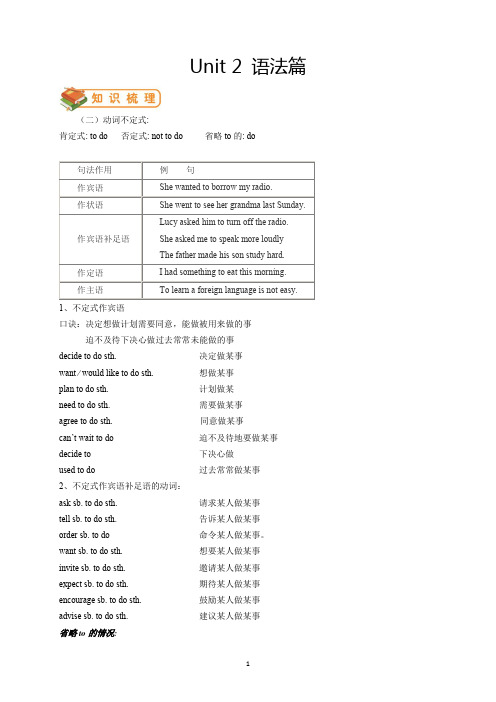
Unit 2 语法篇(二)动词不定式:肯定式: to do 否定式: not to do 省略to的: do1、不定式作宾语口诀:决定想做计划需要同意,能做被用来做的事迫不及待下决心做过去常常未能做的事decide to do sth. 决定做某事want ∕ would like to do sth. 想做某事plan to do sth. 计划做某need to do sth. 需要做某事agree to do sth. 同意做某事can’t wait to do 迫不及待地要做某事decide to 下决心做used to do 过去常常做某事2、不定式作宾语补足语的动词:ask sb. to do sth. 请求某人做某事tell sb. to do sth. 告诉某人做某事order sb. to do 命令某人做某事。
want sb. to do sth. 想要某人做某事invite sb. to do sth. 邀请某人做某事expect sb. to do sth. 期待某人做某事encourage sb. to do sth. 鼓励某人做某事advise sb. to do sth. 建议某人做某事省略to的情况:使役动词:let, make, have感官动词:feel, hear, listen to, look at, see, watch, notice3、动词不定式做主语动词不定式作主语用的动词不定式常常为it替代,动词不定式(或短语)放在后面。
例如:It is not easy to learn a foreign language.It took us three days to do the work.4、动词不定式和疑问词连用动词不定式可以和疑问词what ,which, how, where, when 等连用,构成不定式短语。
如:I don’t know where to go.He showed me how to use a computer.What to do is a big problem.一、请找出下列动词中以动词不定式为宾语的动词并圈出来。
高中英语 外研版必修第二册unit2重点句式和语法讲解
Unit 2 Let’s celebrate!重点句式1....is to honour a person.(教材P13)……是纪念一个人的节日。
【词汇精讲】句中的honour是及物动词,意为“向……表示敬意,尊敬”;honour还可以作名词,意为“荣誉,荣耀,荣幸”。
2.People prepare decorations with flowers and dance around maypoles.(教材P13)人们用鲜花做装饰品,围着五朔节花柱跳舞。
【词汇精讲】句中的decoration是名词,意为“装饰物”。
3.That is why Letters from Father Christmas could be the perfect book for those who regard Christmas as a special time of year.(教材P14)这就是为什么《圣诞老人的信》对那些将圣诞节视为一年中的特殊时刻的人来说是一本完美的书。
【词汇精讲】句中的regard是及物动词,意为“认为,看作”;regard也可作名词,意为“尊重;关注”。
4.In another letter,Father Christmas complained about how he could not stop his helpers playing games with the toys instead of wrapping them up.(教材P15)在另一封信中,圣诞老人抱怨说他无法阻止他的助手们玩玩具,而不是把它们包起来。
【词汇精讲】complain意为“抱怨,不满,发牢骚”。
5.That is why Letters from Father Christmas could be the perfect book for those who regard Christmas as a special time of year.这就是为什么《圣诞老人的信》对那些将圣诞节视为一年中的特殊时刻的人来说是一本完美的书。
B2U2知识梳理构建课件
3. replace replace A with / by B 用B替换A take the place of=take sb’s place= replace代替,替代 in one’s place=in place of 代替
compete admit 知识树 知识相关短语
stand短语
Check the answers
I. 知识树:
1. compete compete in sth. 参加..比赛; compete with/against 与…竞争; compete for 为得到…而竞争
4. charge charge sb money for (doing) sth 因为…向某人收钱 charge sb with sth 控告某人某事 in charge of 掌管… take charge of 掌管…
sth. be in/ under one’s charge = sth. be in the charge of sb. 由…掌管;
5. stand stand for 代表,象征; 主张,支持 stand out 突出,引人注目; stand by 站在旁边,袖手旁观,支持; can’t stand sth /doing sth 不能容忍…
语境活用:
• 1.for 2. to/into 3. having broken • 4. for改为with 5.big 6.bigger
语境活用 1--3
语境活用 4--6
Learning aims
B2U2词汇句型
单元课题:B2U2 The Olympic Games编制: 审阅:WangXin 使用日期:第周第1课时【课前预习案】【Learning Aims学习目标】1.To master new words and expressions from the context.2.To improve the reading abilities: scanning, skimming, careful reading.I.【夯基固本】夯实词汇,学习之本A.重点掌握1.比赛;竞争vi._________________ n.__________________ adj._________________ 2.有魔力的;魔术的adj.__________________ n.____________________ 3.定期的;常规的adj.__________________ adv.________________ 4.承认;容许v.____________________ n.____________________5.主办;做东v&n._______女主人,男主人________6.责任职责n.__________adj.________________7.取代;替代v._________8.收费;控诉;收费;主管v.&n._______________9.物理的;身体的adj.__________________n.____________________adj.__________________10.做广告vt.&vi.______11.讨价还价;便宜货vi.&n_________________12.绝望的adj. _________n._________________满怀希望的adj_________13.愚蠢的v.___________v.&n_________________adj___________________14.应收报答或惩罚vi.&vt._______________B.识记词汇1. ancient adj._________2. Greece n. ________3. volunteer n.&adj.&vt___4. athlete n._______5. basis n. ___________6. slave n. ___________7.stadium n.____________8. gymnasium n.________9. motto adj. __________10. swift adv. _________11. similarity n.________12. fine n. ____________13.poster n. __________14.glory n. __________15.prince n.___________16.maid n. ___________17.debate n./v. ________18.former adj._________C.重点短语1. 参加___________________________2.代表;象征______________________3.也;又;还_________________4.主管;看管___________________5.陆续地_______________________1. Pausanias, who was a Greek writer about 2000 years ago, has come on a magical journey on March 18th, 2007 to find out about the present-day Olympic Games.2. Only athletes who have reached the agreed standard for their event will be admitted as competitors.3. That’s why they’re called the Winter Olympic.4. No other countries could join in, nor could slaves or women!5. Women are not only allowed to join in but play a very important role in gymnastics, athletics, team sports and …6. There’s as much competition among countries to host the Olympics as to win Olympic medals.。
B2U2知识点
Unit 2 知识点小组活动提纲1)take part in 的用法:大兴练习册P28。
补充:join sb / join +某个组织(army, the Party)完成下面的练习:1. My brother the army in 2002.2. I didn't want to their argument.3. May I the competition?4. We are playing football. Do you want to ?5. You are welcome to us.2)What do the five rings on the Olympic Games stand for?翻译本句话:_________________________________________________3) …., 2007 to find out about the present-day Olymipic Games.a)找出课本中原句的主语____________, 谓语__________, 定于从句___________________________________.b) In the long run, you not only find out about the world and the people in it; youfind out about yourself, too.翻译本句话:_____________________________________________________ 4) I used to write about……….找出书本上的原话并翻译本句话.___________________________________________________________________ used to __________看句子翻译下面短语:a) I am used to reading newpaper. Be used to doing: ___________________b)It was used to make paper. Be used to do:______________________c)I used to read newspaper. used to do:______________________5)查词典Good heavens!________________________6)But of course you can …….找出书本上本句话的并翻译__________________7)every four years ___________________大兴P29I was ill in hospital, and my friend went to see me___________( which is wrong)A) erery other day B everyday C every two day D every second day8)on a ragular basis __________________参照课本原句翻译下面的句子:这些信息以月为单位公布(publish). _____________________________________On the basis of day = on the daily basisIs it accurate to predict the result on the basis of one secret vote?翻译中文:________________________________________________________9)Only athletes who have reached the agreed standard for their event will be admitted as competitors.a)找出课本中原句的主语____________, 谓语__________, 定于从句___________________________________.b) 看大兴P29 admit 的用法翻译We admit him as our leader. 改成被动:_______________________________我承认做这件事。
- 1、下载文档前请自行甄别文档内容的完整性,平台不提供额外的编辑、内容补充、找答案等附加服务。
- 2、"仅部分预览"的文档,不可在线预览部分如存在完整性等问题,可反馈申请退款(可完整预览的文档不适用该条件!)。
- 3、如文档侵犯您的权益,请联系客服反馈,我们会尽快为您处理(人工客服工作时间:9:00-18:30)。
将来时的被动语态编稿:陈玉莲审稿:概念引入:We shall be punished if we break the rule.如果我们违反规定,我们将要受到惩罚。
The meeting won’t be held tomorrow.明天不再举行会议。
Won’t water be turned into ice, it is bel ow freezing?如果气温在冰点之下,水难道不会变成冰吗?When will these books be published?这些书将在什么时候被出版?语法点拨一般将来时一般将来时表示将来某个时间要发生的动作或存在的状态,也表示将来经常发生的动作。
一般将来时结构:1. 主语+ will (shall) + 动词原形(所有人称都可以用will,shall只用于I, We 后面)一般将来时,表示事情将要发生。
肯定式:They will finish the work next week. 他们下周完成这个工作。
否定式:They won’t finish the work next week.他们下周不完成这个工作。
疑问式:Will they finish the work next week? 他们下周完成这个工作吗?2. 主语+ be (am, is, are) going to + 动词原形be going to, 表打算,准备计划将来干;表可能,有必然,通过现象来判断。
I’m going to see a film this evening. 今晚上我打算去看电影。
We aren’t going to have any lessons next w eek. 我们下周不上课。
It’s going to rain. 天要下雨了。
将来时的几种形式:1. 对于事先经过考虑的打算、计划,应使用be going to 结构。
Why are you taking down all the pictures? I am going to repaint the wall.2. 对于事先未经过考虑的打算、计划,而是临时起意,则用will 结构。
常见于会话时,对对方的话做出的反应。
表示即将发生某事时,be going to和will区别不大,多可互换。
正式的通知等多用will。
be going to 一般指较近的将来,will则表示较远的将来。
—Where is the telephone book? 电话薄在哪儿?—I’ll go and get it for you .我去拿给你。
What is going to happen? 要发生什么?What will happen? 要发生什么?She will be given a gold medal. 她将被授予金牌。
A new Hope School will be opened in our village. 我们家乡将开办一所新的希望学校。
In a few years' time, those mountains will be covered with trees, too.过几年以后,那些山上会长满了树。
3. be about to + 动词原形, 表示即将发生的动作。
The concert is about to begin. 音乐会即将开始。
4. be +动词不定式,表示安排或计划好的动作。
There is to be a sports meeting next week. 下周将有运动会。
被动语态英语的语态是通过动词形式的变化表现出来的。
英语中有两种语态:主动语态和被动语态。
主动语态表示主语是动作的执行者。
Many people speak Chinese.谓语speak的动作是由主语many people来执行的。
被动语态表示主语是动作的承受者,即行为动作的对象。
Chinese is spoken by many people. 主语English是动词speak的承受者。
【高清课堂:高一英语语法(一)被动语态391789主动变被动】主动变被动一般规律All the people laughed at him. 所有人都嘲笑他。
→He was laughed at by all the people. 他被所有人嘲笑They make the bikes in the factory. 他们在工厂生产自行车。
→The bikes are made by them in the factory. 这些自行车被他们在工厂生产。
They sold out the tickets. 他们卖完了票。
→The tickets were sold out. 票被卖光了。
规则:1. 把主动语态的宾语变为被动语态的主语。
2. 把谓语变成被动结构(be+过去分词)3. 把主动语态中的主语放在介词by之后做宾语,将主格改为宾格。
含有情态动词的被动语态由“情态动词+be+过去分词”构成We can repair this watch in two days. 两天内我们能修好这钟表。
→This watch can be repaired in two days. 这块钟表两天内能修好。
They should do it at once. 他们应该立即做这件事。
→It should be done at once. 这件事应该马上去做。
I have to finish it. 我得完成它。
→It has to be finished. 它得被做完。
含有双宾语的主动语态变被动语态(give, lend, pass, cook, buy, sing, etc.)主动语态:主语+ 谓语动词+ 间接、直接宾语+ 其他被动语态:间接宾语+ be + 过去分词+ 直接宾语+ 其他(比较常用)或:直接宾语+ be + 过去分词+ 介词(for / to) + 间接宾语+ 其他My father gave me a new book on my birthday.→I was given a new book on my birthday (by my father).→A new book was given to me on my birthday (by my father).父亲在我生日送我一本新书。
My sister passed me salt during lunch.→I was passed salt during lunch (by my sister).→Salt was passed to me during lunch (by my sister).午餐期间姐姐给我递盐。
带有复合宾语的主动语态变为被动语态把宾语变为被动语态的主语,原来的宾语补足语不动。
His teacher found him a very good pupil.→He was found a very good pupil by his teacher.他的老师发现他是个好学生。
let, make, see, hear变被动在主动句中,let, make, see, hear等动词后作宾补的动词不定式不带to,但在被动句中,则要保留to。
Linda’s parents make her practice the piano every Sunday.→Linda is made to practice the piano every Sunday.琳达的父母让她每周日练习钢琴。
“动词+介词”,“动词+副词”等短语变被动语态切记介词或副词不能丢!1. 她照顾她奶奶。
She looks after her grandmother.→Her grandmother is looked after (by her).2. 我们写作文应该注意什么?(pay attention to)What should be paid attention to when we write a composition?3. 他是叔叔养大的。
(bring up)He was brought up by his uncle.4. 许多新单词需要查。
(look up)Lots of new words have to be looked up.5. 他经常被人嘲笑。
(make fun of)He is often made fun of.◆一般将来时的被动语态的用法1. 表示根据计划或者安排将要发生的被动性动作。
This work will be done at once. 这项工作将立即完成。
Those books will be published next month. 那些书将于下月出版。
The bridge will be finished next month. 这座桥将于下个月完工。
The problem is going to be discussed at the meeting. 那个问题将在会上讨论。
The sports meet is to be held on Oct. 5. 运动会将于10月5日举行。
The 2012 Olympics will be held in London. 2012年奥运会在伦敦举行。
New medals will be designed. 新的奖牌将被设计。
The problem will be solved next Thursday. 问题下周三将会解决。
2. 表示有固定性条件就有规律性被动结果。
Heated to 100℃, water will be turned into steam.加热到100度时,水将会变成蒸汽。
If you speak in class, you will be punished.如果你在课堂上讲话,你将会受到惩罚。
总结:一般将来时的被动语态表示“……将要被……”,其常用的表达形式有以下几种:1. will / shall be done shall常用于第一人称,will可用于任何人称。
2. be (am / is / are) going to be done3. be to be done4. be about to be done一般将来时的被动语态由肯定式变成否定式、疑问式时均应借助于助动词will/ shall来完成,如构成否定句时直接在will/ shall 后加not; 构成一般疑问句时将will/shall提前,其简略回答保留will/ shall。
This bridge will be built soon, won’t it? 这座桥很快将被建成,是吗?Won’t water be turned into ice, if it is below freezing?如果气温在冰点一下,水难道不会变成冰吗?一般将来时的被动语态的使用场合如果一个动作在将来某个时间发生或持续, 且句子的主语又是该动作的承受者, 那就要用一般将来时的被动语态。
